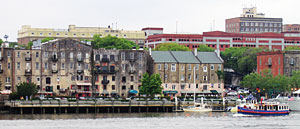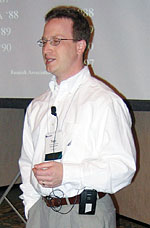
The Business Conference brought together wholesalers and manufacturers both to plan for the upcoming Annual Fall Conference (Oct. 29-Nov. 1 in Phoenix), and to talk about issues of mutual interest. The Southeastern Meeting was one of a number of regional meetings for wholesaler members held each spring. The business meeting rotates among them on a yearly basis.

Counterperson Certification
Cutting across meetings and corridor conversations was the Certified Counter Specialist Program HARDI has launched "to recognize the professionalism of the men and women at the wholesale counter," according to HARDI officials. Member companies employ more than 6,800 counter and inside salespersons.The organization's education committee said the program has four broad-based objectives:
1. To establish industry-recognized standards of performance, education, and training.
2. To encourage training and education, as well as practical experience.

4. To increase awareness among potential entry-level people of the minimum requirements for wholesale counter sales positions.
The program has four levels of recognition: Assistant Counter Specialist (for the person starting out), Associate Counter Specialist, Senior Associate Counter Specialist, and Certified Counter Specialist (the highest level).
The committee "has established minimum (mandatory) educational and training experiences for each level of recognition," the association said. At the request of a wholesaler's management, a training coordinator is assigned to locally supervise and document each person's participation. The program is open to HARDI members.

Higher Efficiencies
Much of the first full day of activities in Savannah was given over to committee meetings. Here is an overview of some of those meetings.
Committee members wanted such topics to comprise a seminar at the fall conference. They also discussed HARDI's preparation of general literature regarding proper servicing of compressors, which can be given to technicians when they pick up such a component from their local supply house.
They also predicted that the full-scale debut of R-410A in air conditioning equipment would wait until the 13 SEER issue resolves itself, since the requirement to go to 13 SEER comes about four years before the required end of production of new equipment using R-22.

At The Podium
In a talk called "A Survival Guide for Privately Held Businesses," Terrance and Leon Resnick of the Harrisburg, Pa.-based consulting group Resnick Associates, took attendees through the proper procedures for passing a business from generation to generation.Terrance Resnick noted that only 33 percent of family-owned businesses are successfully passed on to a second generation, and only 15 percent to a third generation. Often the cause is lack of proper planning, he said.
Leon Resnick said, "Without proper planning, the results of your hard work will mostly benefit the IRS." But he said it is possible to be in control. "In that case, you will decide what happens with your company and estates. You can choose to protect your years of hard work with proper planning or risk losing significant business and nonbusiness assets."
The talk included a number of examples of ways to deal with various issues with a family business. Throughout their session, the brothers encouraged audience members to begin a review of estate and business succession plans if they have not already done so, and to work with those who already have skills in such situations.

The similarity to his wholesaler audience was that he and they "are in the people business. And it is about the people. People who feel good about themselves are going to do good for you."
He stressed the need for leadership rather than just being a manager as a central element in the successful operation of any business.
"Your attitude means everything."
Publication date: 05/16/2005


Report Abusive Comment